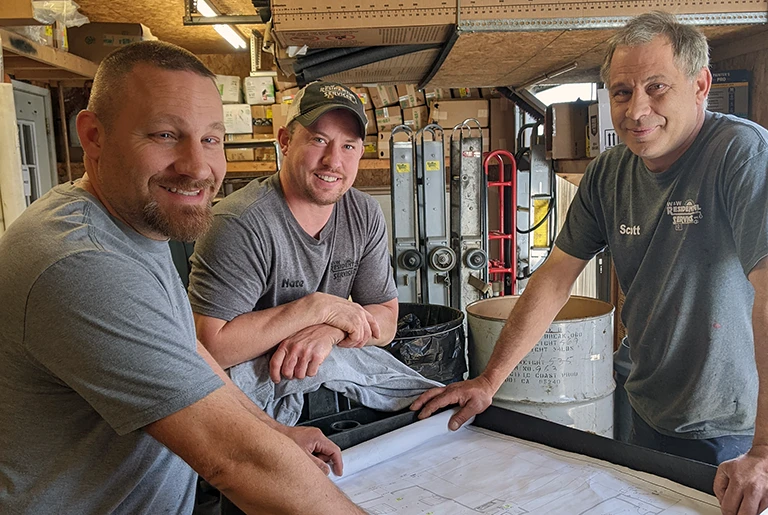Clogged drain lines are a common household issue that can lead to significant frustration and costly repairs if not addressed. Fortunately, there are several preventative steps you can take to avoid blockages in both kitchen and bathroom drains. As an experienced plumber for Herndon and surrounding areas, here’s a guide we’ve put together to keep your drains flowing freely.
1. Be Careful with What You Put Down the Drain
The easiest way to prevent clogs is to be mindful of what you allow into your drain pipes.
- Kitchen Sink:
- Avoid grease and oil: Grease from cooking can solidify inside your pipes, leading to clogs over time. Instead of pouring it down the drain, collect used oil, grease, meat fat, etc. in a container or soak it up with a paper towel and throw it in the trash.
- Use a strainer to catch food particles: Strainer or drain screens are inexpensive and easy to use. They are designed to catch scraps before the food can get stuck in pipes causing a clog. Be sure to clean them regularly.
- Food scraps: Even if you have a garbage disposal, avoid putting large amounts of fibrous, starchy or large chunks of food down the drain. Examples include banana or potato peels, pineapple, watermelon, cantaloupe rinds, avocado or peach pits, large hunks of meat, etc. See #3 below for more tips on proper use of a garbage disposal.
- Coffee grounds: These tend to clump together and create blockages. Always dispose of coffee grounds in the trash or compost bin.
- Bathroom Sink, Shower & Toilet:
- Hair: Hair is one of the main culprits behind bathroom drain clogs. Use a hair catcher or drain screen to trap hair before it gets washed down the drain.
- Soap scum: Over time, soap can break down into a residue that sticks to pipes. Opt for liquid soap over bar soap and clean your drains regularly to prevent buildup.
- Toiletries, hygiene products, “flushable wipes”: Avoid flushing wipes (even when they say “flushable”), cotton balls or feminine hygiene products down the toilet, as these do not break down easily and can block pipes.
- Toys and clothing: When children are in the house, it’s a good idea to keep the toilet lid closed to avoid toys, clothing items such as socks, underwear and diapers from getting flushed.
- Not all toilet paper is drain friendly: Avoid thick, heavy, “ultra-absorbent” toilet paper. One ply, such as Scott brand, breaks down very easily and is not likely to clog.






2. Regular Cleaning and Maintenance
Even if you’re careful about what goes down the drain, debris can still build up over time. Regular cleaning and maintenance can keep your drain lines clear.
- Flush with hot water: Once a week, run hot water down your kitchen drains to help dissolve any potential grease or soap buildup.
- Use baking soda and vinegar: This natural cleaner can help break down organic materials in the drain. Pour half a cup of baking soda followed by half a cup of vinegar down the drain. Let it fizz for a few minutes, then flush with hot water.
- Enzyme-based drain cleaners: These are safer for your pipes and the environment than chemical cleaners. They work by breaking down organic matter like food, hair and soap.
- Leave chemical drain cleaners to the professionals: While it may be tempting to use an over-the-counter chemical-based drain cleaner, they can do more harm than good. They can be dangerous if not handled properly, and they are not environmentally friendly. If you have a persistent clog, it’s best to call a professional for help.
3. Check and Maintain Your Garbage Disposal
- Don’t let the name “garbage disposal” fool you: These handy kitchen devices are NOT intended for trash or garbage! Soft foods only. Avoid large amounts of fibrous foods including meats. Also avoid paper, cardboard, bones, glass or metal of any kind.
- Proper maintenance is required to avoid clogs. Run water prior to, during and after use. Every few days, run hot water for a few minutes to dissolve any build-up in the drain or pipes. Avoid scent sticks or pods. Instead use orange or lemon peels to freshen the drain.
4. Call a Plumber
- Frequent clogs or slow, sluggish drains or flushing are a red flag: If you notice your drains are frequently getting clogged or water is draining slowly or gurgling, it may be time to give us a call for an inspection. We use specialized tools and cameras to inspect the condition of your pipes and clear any potential blockages before they become major problems. Some towns and municipalities have old terracotta pipes connecting to main sewer lines. Once these start to deteriorate, clogs can become a major issue requiring replacement. Tree roots can also cause issues which require professional intervention.
Preventing clogged drains in your kitchen and bathroom is all about mindful use and regular maintenance. By controlling what goes down your drain and performing periodic cleanings, you can avoid costly repairs and ensure that your plumbing system runs smoothly. Investing a little time now will save you a lot of hassle later!
For professional drain cleaning or other plumbing help near Herndon, call W&W Residential Services at (570) 758-4250 or contact us. We are here to handle maintenance, repair and emergency plumbing needs.



